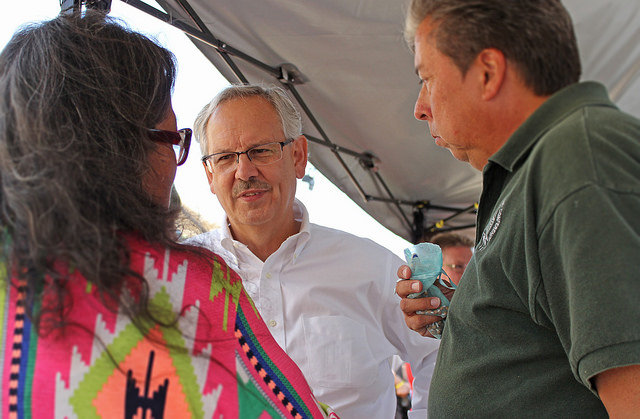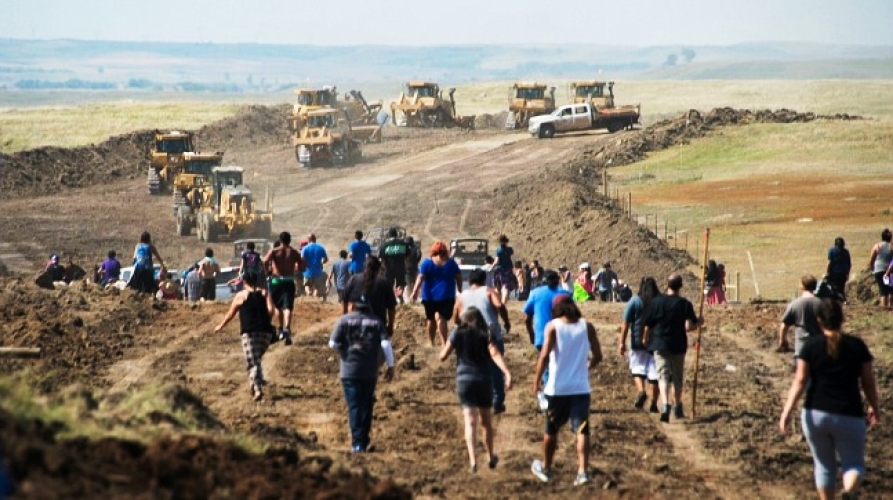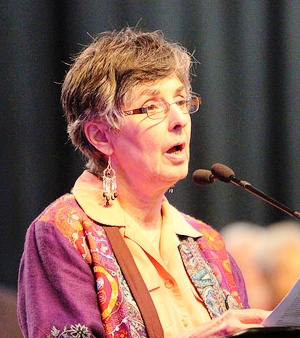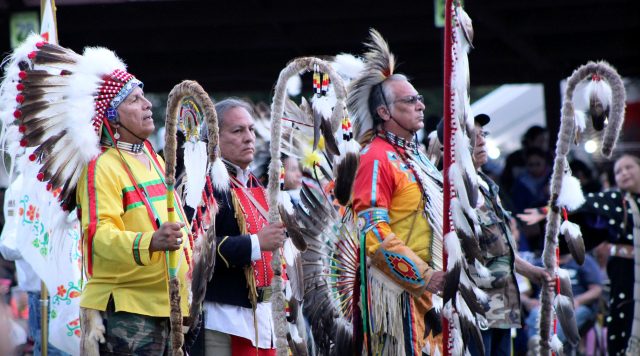By John W. Coleman
Eastern PA Conference Communications Director
Protests are growing to halt the construction of a crude oil pipeline in North Dakota that Native Americans fear will pollute their water and violate sacred burial sites. And more United Methodists are joining in a supportive witness both onsite and from a distance through correspondence and public statements. (Read “Clergy head to Standing Rock for protest.”)
The historic protests, led by the local Standing Rock Sioux Nation, are aimed at blocking the 1,170-mile Dakota Access Pipeline that would cross four states, come within a half-mile of the Sioux nation’s reservation land and run under the Missouri River. Numbers of concerned advocates from around the U.S. and beyond have swelled since summer. But recently, several violent encounters with law enforcement have led to arrests of hundreds of demonstrators, some complaining of attacks and abuse by the heavily armed police.
Included among the thousands attracted to the Oceti Sakowin (“Seven Council Fires” in Lakota) Camp in Cannon Ball, N.D., are unprecedented numbers of Native Americans, plus environmental activists and celebrities, many of whom call themselves not protestors but “protectors” of Native rights and the safety of land and water resources.
 Bishop Bruce Ough and other leaders of the Dakotas Conference, as well as United Methodists from other conferences and agencies, have visited the camp to learn more and to stand in solidarity with protesters. The General Board of Church and Society issued a “Standing Rock – A call for solidarity” statement on Sept. 2, just as the Rev. Dr. Susan Henry-Crowe, General Secretary, was about to visit the protest site.
Bishop Bruce Ough and other leaders of the Dakotas Conference, as well as United Methodists from other conferences and agencies, have visited the camp to learn more and to stand in solidarity with protesters. The General Board of Church and Society issued a “Standing Rock – A call for solidarity” statement on Sept. 2, just as the Rev. Dr. Susan Henry-Crowe, General Secretary, was about to visit the protest site.
Meanwhile, there have been peaceful protests in the Philadelphia area—including one held Nov. 3 in Center City and several more held in September that Eastern PA Conference members attended.
United Methodists express support in solidarity
Members of the conference’s Committee on Native American Ministries, attending a Northeastern Jurisdictional CONAM meeting in West Virginia in October, helped draft and signed a letter sent by the group Oct. 8 to Standing Rock Sioux Tribal Chairman David Archambault.
“As a sign of our commitment to The United Methodist Church’s Act of Repentance toward Healing Relationships Indigenous Peoples and our ongoing work for justice for Native Peoples, we joined our voices with the growing numbers of advocates surrounding the Standing Rock Sioux Tribe,” said the Rev. Suzanne Duchesne, Eastern PA CONAM member who coordinates communications for the NEJ committee. “The NEJ CONAM pledged to further its support by connecting with United Methodist Church representatives on the ground at the protest site.”
Bishop Peggy Johnson, who serves as an episcopal representative on the jurisdictional CONAM, writes in her Bishop’s Blog, “As we begin Native American Heritage month in November it is clear that there is much work needed in this nation of ours with regards to justice and healing with our Native American citizens. On the backdrop of the Standing Rock stand-off with federal officials over an oil pipeline, we ponder once again the sad discrimination that is happening there.
“Native American people deserve to have the assurance that they have access to clean water and respect for their tribal burial grounds. These issues and many more broken treaties and injustices have created a lingering historical trauma in the lives of our First Nation people.”
broken treaties and injustices have created a lingering historical trauma in the lives of our First Nation people.”
Meanwhile, the Western Jurisdiction College of Bishops sent a letter to President Barack Obama Oct. 25 in support of the Standing Rock Sioux Nation and in opposition to the Dakota Access Pipeline.
“We recognize that the abundance enjoyed by many in the United States has come at the expense of the original inhabitants of this land, and we recognize that we have a moral obligation to seek just relationships with their descendants,” wrote the bishops.
“The United Methodist Church pledges its support in upholding Native American access to and protection of sacred sites and public lands for ceremonial purposes. We affirm the rights of Native Americans to preserve culture, land, religious expression, and sacred spaces (2016 Book of Resolutions, #3321 Native People and The United Methodist Church).”
Quoting further from the UMC’s Book of Resolutions, they added, “We believe that Native peoples have a right to clean water and safe living environments. We believe that sovereign tribes have a right to free, prior, and informed consent to proposed infrastructure projects impacting their lands.” (2016 Book of Resolutions, #1025 Environmental Racism).
President Obama has asked the U.S. Army Corps of Engineers, sponsors of the pipeline, to explore alternatives, including rerouting the pipeline, which reportedly is about 70 percent complete.
“We affirm your administration’s plan to reconsider previous decisions about the legality of the Dakota Access Pipeline, and we call for a permanent halt to this project,” reads the letter signed by 10 active and retired bishops. “We also affirm your plan to invite tribes to formal, government-to-government consultations on ways in which federal rules on national infrastructure projects could better protect tribal resources and rights, and on the possibility of new legislation to promote those goals. We call on the leaders of this project to do all in their power to respect the rights, dignity, and sacred lands of the Standing Rock Sioux Nation and all Native American tribes.”
And locally, one CONAM member spoke to her congregation about the controversy and shared photos during its Oct. 30 Sunday worship service. Following this story is the report given by Sherry Wack to her church, Evansburg UMC, where she has taught several classes on Native American concerns and the Act of Repentance over the past few years. She plans to bring a photo display to the CONAM special worship and fellowship celebration at Innabah Camp & Retreat Center on Sunday, Nov. 6 (at 4 PM).
STANDING ROCK TALK, by Sherry Wack, at Evansburg UMC, October 30, 2016
 An oil company is building a pipeline that will go from North Dakota to Illinois. They plan to dig under the Missouri River ½ mile from the Standing Rock Sioux Reservation. When Ladonna Brave Bull Allard saw the planned route of the pipeline she realized that her way of life would end if it went through.
An oil company is building a pipeline that will go from North Dakota to Illinois. They plan to dig under the Missouri River ½ mile from the Standing Rock Sioux Reservation. When Ladonna Brave Bull Allard saw the planned route of the pipeline she realized that her way of life would end if it went through.
April 1 Ladonna Brave Bull Allard, Standing Rock Sioux tribal historian, invited friends to join her on her land at the confluence of the Cannonball & Missouri Rivers to resist the DAPL by prayer and non-violent direct action. She called it the Sacred Stone camp.
She recounts, Where the Cannonball River joins the Missouri River, at the site of our camp today to stop the Dakota Access pipeline, there used to be a whirlpool that created large, spherical sandstone formations. The river’s true name is Inyan Wakangapi Wakpa, River that Makes the Sacred Stones, and we have named the site of our resistance on my family’s land the Sacred Stone Camp. The stones are not created anymore, ever since the U.S. Army Corps of Engineers dredged the mouth of the Cannonball River and flooded the area in the late 1950s as they finished the Oahe dam. They killed a portion of our sacred river.
This area has had immeasurable significance for the Indians for thousands of years, spiritual, cultural and pragmatic. It is central to their community life.
The oil company had originally planned to lay the pipeline upriver, impacting a white community, but when that community objected, they moved the path of the pipeline to Indian country because everyone knows you can just take land from Indians. The oil company never included the Standing Rock tribe in their planning, nor did they care how their plan would impact the lives of the Indians living 1/2 mile from the proposed route.
To date thousands of Native Americans from over 100 tribes as well as indigenous people from Alaska and places as far away as Norway and Ecuador have come to support the movement.
The last week of August construction was temporarily halted by federal court and tribal historians submitted the locations of sacred prayer sites and burial sites to the federal court. Then on Saturday, Sept 3, in a sneak attack at dawn the oil company bulldozed those very sites while a private security force equipped with pepper spray and attack dogs kept the Water Protectors away, causing much anguish and injury. Children and elders suffered dog bites.
In September Ladonna’s daughter was riding in the back seat of a car when the sheriff’s deputies stopped the car, arrested her without cause, strip searched her and left her naked in a jail cell overnight .
This past Friday Over 300 police officers from 5 states in riot gear, 8 ATVs, 5 armored vehicles, 2 helicopters, and numerous military-grade humvees showed up. In addition to pepper spray and percussion grenades, shotguns were fired into the crowd with less lethal ammunition and a sound cannon was used. In the ensuing chaos many people were injured and 2 horses were shot with live ammunition and killed. Elders were dragged from a sweat lodge, thrown on the ground in their underwear and arrested.
The Indians are protesting the damage being done to land that was allotted to them in the Fort Laramie Treaty of 1851 for “as long as the grass grows…yada, yada, yada.” The “Water Protectors” continue to be non-violent, even in the face of military grade harassment.
The issue here is not just environmental – the risk of contamination of the Missouri River and then the Mississippi, impacting millions of Americans, although that is certainly very important. You can be sure there will be an oil spill at some point. In the past 12 months North Dakota reported 272 uncontained oil spills and 904 contained oil spills. But the greater issue is the continued marginalization, abuse and disregard of Native Americans. In this historic conflict the oil company and the law enforcement agents are actually breaking federal law. Peaceful protesters are being threatened, injured and harassed. Journalists are being arrested for doing their jobs. This alone should send up a red flag to every American because whenever a dictator or fascist regime or Nazi takes over a land, freedom of speech, freedom of the press and freedom of assembly are the first things to go.
Here follows a quote from a Native writer:
It is crucial that people recognize that Standing Rock is part of an ongoing struggle against colonial violence. #NoDAPL is a front of struggle in a long-erased war against Native peoples — a war that has been active since first contact, and waged without interruption. Our efforts to survive the conditions of this anti-Native society have gone largely unnoticed because white supremacy is the law of the land, and because we, as Native people, have been pushed beyond the limits of public consciousness.
The fact that we are more likely to be killed by law enforcement than any other group speaks to the fact that Native erasure is ubiquitous, both culturally and literally, but pushed from public view.
The struggle at Standing Rock is an effort to prevent the construction of a deadly, destructive mechanism, created by greed-driven people with no regard for our lives. It has always been this way. We die, and have died, for the sake of expansion and white wealth, and for the maintenance of both.
The harms committed against us have long been relegated to the history books. This erasure has occurred for the sake of both white supremacy and US mythology… It has also been perpetuated to sustain the comfort of those who benefit from harms committed against us. We have always been here, fighting for our lives, surviving colonization, and that reality is rarely acknowledged.
And to quote Ladonna Brave Bull Allard:
The U.S. government is wiping out our most important cultural and spiritual areas. And as it erases our footprint from the world, it erases us as a people. These sites must be protected, or our world will end, it is that simple. Our young people have a right to know who they are. They have a right to language, to culture, to tradition. The way they learn these things is through connection to our lands and our history.
If we allow an oil company to dig through and destroy our histories, our ancestors, our hearts and souls as a people, is that not genocide?
Today, we honor all those who have survived centuries of struggle. Today, we stand together in prayer to demand a future for our people.
This past week over 250 Water Protectors were arrested. These people are not our enemies. Why should they have to fight so hard to survive in their own lands?

